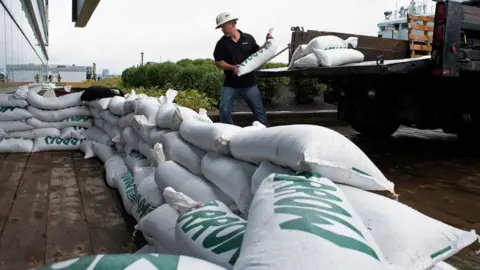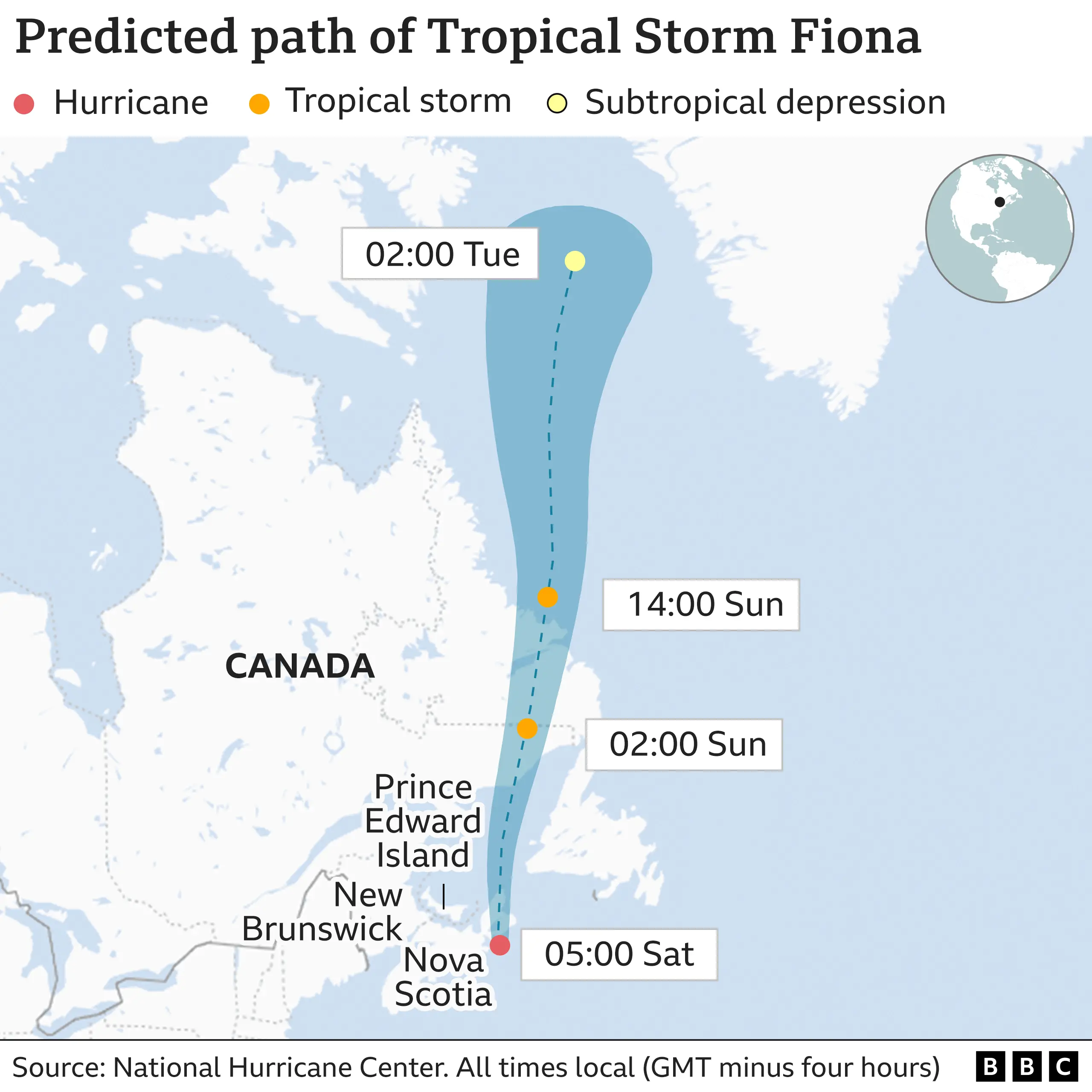Hurricane Fiona: Canada hit by 'historic, extreme event'
Hundreds of thousands of people have been left without power, after Storm Fiona hit Canada's coastline.
Fiona was downgraded from a hurricane to a tropical storm on Friday.
But parts of three provinces experienced torrential rain and winds of up to 160km/h (99mph), with trees and powerlines felled and houses washed into the sea.
Prime Minister Justin Trudeau said the situation was critical, and promised to provide support through the army.
Officials have yet to share reports of fatalities or serious injuries, but authorities are dealing with extensive flooding.
In a briefing Mr Trudeau described Fiona as "a very powerful and dangerous storm" and said the army will be deployed to help with assessment and clean-up efforts. His government has already responded positively to a request by Nova Scotia authorities for assistance.
"If there is anything the federal government can do to help, we will be there," he said, adding that he would no longer travel to Japan to attend the funeral of former Prime Minister Shinzo Abe.
Tropical storm warnings were issued for the Atlantic provinces of Nova Scotia, Prince Edward Island, Newfoundland and New Brunswick, as well as in parts of Quebec.
The country's eastern region could receive up to 10in (25cm) of rain, increasing the risk of flash flooding.
 Reuters
ReutersIn Nova Scotia, shelters were prepared in Halifax and Cape Breton for people to take cover ahead of the storm.
"We have been through these types of events before, but my fear is, not to this extent," said Amanda McDougall, mayor of Cape Breton Regional Municipality. "The impacts are going to be large, real and immediate."
In Port aux Basques, with a population of 4,067 on the southwest tip of Newfoundland, intense flooding saw some homes and office buildings washed out to sea, local journalist Rene Roy, told CBC. The area is under a state of emergency.
"This is hands down the most terrifying thing I've ever seen in my life," Mr Roy said.
He added that many homes were left as "a pile of rubble in the ocean right now", adding: "There is an apartment building that's literally gone. There are entire streets that are gone."
Officials later confirmed that at least 20 homes had been lost.
And the Royal Canadian Mounted Police said a woman was rescued after being "tossed into the water as her home collapsed" in the area. They said another report of a women being swept out from her basement had been received, but conditions remained too dangerous to conduct a search.
Power companies have warned that it could take days to restore electricity, as wind speeds remain too high to start work on downed power lines.
Severe hurricanes in Canada are rare, as storms lose their energy once they hit colder waters in the north and become post-tropical instead. But pressure in the region is predicted to be historically low as Storm Fiona hits, making way for a heavier storm.
Nova Scotia was last battered by a tropical cyclone in 2003 with Hurricane Juan, a category two storm that killed two people and heavily damaged structures and vegetation.
Meteorologist Bob Robichaud warned on Friday afternoon that Fiona will be bigger than Juan, and stronger than 2019's Hurricane Dorian, which also reached the shores of Nova Scotia.

Fiona had already wreaked havoc on Puerto Rico and the Dominican Republic earlier this week, with many still left without power or running water.
Florida also faces a hurricane threat as tropical storm Ian strengthened as it moved over the Caribbean on Saturday. It could approach Florida early next week as a major hurricane.
Ian's projected path takes it just south of Jamaica, over western Cuba and into Florida, the hurricane centre said.
Florida Keys and South Florida could be hit by heavy rains on Monday, according to forecasters.
Florida Governor Ron DeSantis declared a state of emergency on Friday, freeing up funding and emergency services in advance of the storm.
